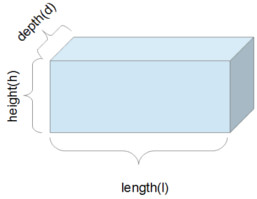The Mass or Weight of a Solid Cuboid formula provides the weight or mass of a cuboid (a.k.a. box, right parallelepiped ) of length (l), height (h) and depth (d) and a mean density (mD).
INSTRUCTIONS: Choose units and enter the following:
- (l) Length
- (h) Height
- (d) Depth
- (mD) Mean Density.
Cuboid Mass (M): The calculator returns the mass in kilograms. However this can be automatically converted to compatible units via the pull-down menu.
The Math / Science
The Mass or Weight of a cuboid or rectangular container formula computes the volume of rectangular geometric shape based on the input parameters. With the volume of the cuboid, this formula then executes the simple equation below to compute the approximate mass of the object.
`M = mD * L * D * H`
where:
- M = Mass of the Object
- mD = Mean Density of the Object
- L = Length of the cuboid
- W = Width of the cuboid
- H = Height of the cuboid
The mean density (mD) of many common substances, elements, liquids and materials can be found by clicking HERE(e.g. the `mu_(density) (water)` is 1000.0 kg/m³).
Mean Density Table
| Common Mean Densities in Kilograms per Meter Cubed (kg/m3) | ||
|
Fluids
Fuels
Market-Ready Grains |
Metals
|
Earthen
Synthetic
Organic
|
| Mean Density Lookup Function | ||
Mean density is scientifically volume divided by mass. There are various unit for density adopted by cultures and industries. Common units for density included the following:
- kilograms per cubic meter (kg/m3)
- grams per cubic centimeter (g/cm3)
- grams per liter (g/L)
- pounds per cubic feet (lb/ft3)
- ounces per cubic inch (oz/in3)
- pounds per barrel (lb/bbl)
- pounds per bushel (lb/bu)
If you want to identify a material by its density, use the Density Within Range tool.

Weight is technically the downward force that a mass exerts based on the force of gravity and the mass of the object. On the surface of the Earth, mass and weight are often interchanged. In some places, objects are sold by the gram (mass), and in other locations, the same objects are sold by the ounce (weight).
The Weight Calculators use the dimensions of an object and its shape to compute the objects volume. They then apply a density associated with a material to estimate the objects weight.

Weight Calculators
- Weight from Area, Height and Density
- Cube Weight
- Box Weight
- Cone Weight
- Cone Frustum Weight
- Cylinder Weight
- Slanted Cylinder Weight
- Semicircle Weight
- Triangular Weight
- Quadrilateral Weight
- Pentagon Weight
- Hexagon Weight
- Heptagon Weight
- Octagon Weight
- Nonagon Weight
- Decagon Weight
- Hendecagon Weight
- Dodecagon Weight
- Paraboloid Weight
- Polygon Pyramid Frustum Weight
- Sphere Mass
- Sphere Cap Weight
- Sphere Segment Weight
- Sphere Shell Mass
- Oblate Spheroid Mass
- Ellipsoid Weight
- Torus Weight
- Bottle Weight
- Bottle Content Weight
- Chamfer Weight
- Ring Weight